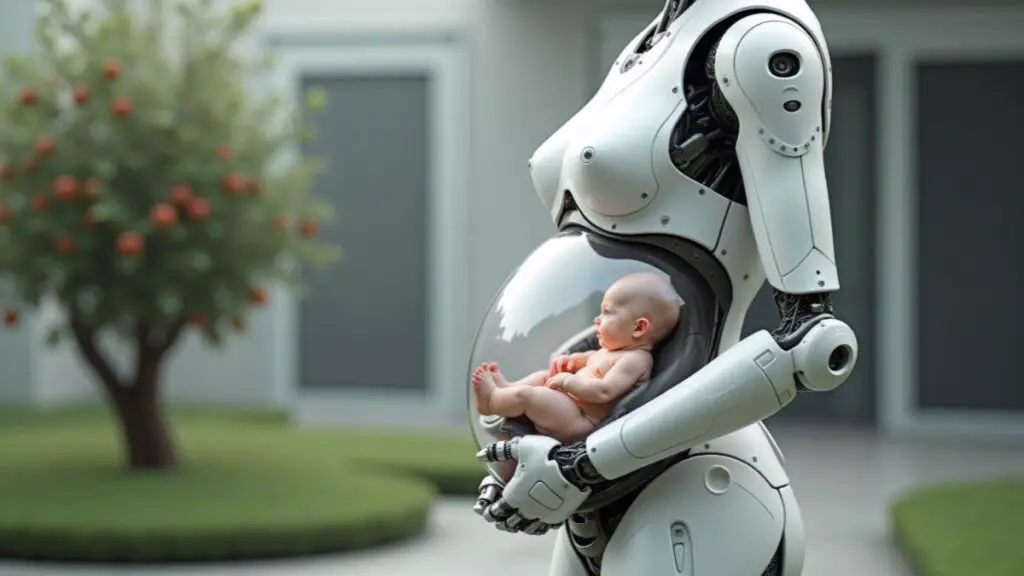When headlines about pregnancy robots broke this week, the internet exploded with curiosity, shock, and skepticism. A Chinese CEO announced plans to develop a robot capable of sustaining a human pregnancy from conception to birth, with a prototype expected as early as next year.
The idea raises profound questions about technology, ethics, biology, and humanity’s relationship with life itself. Could such a device ever become a reality, and if it did, would people actually use it?
The notion of pregnancy robots isn’t entirely new. Scientists have been exploring artificial wombs, or ectogenesis, for decades. In 2017, researchers at the Children’s Hospital of Philadelphia successfully kept premature lambs alive in a biobag artificial womb filled with amniotic fluid.
This was hailed as a breakthrough for neonatal care, offering hope for preterm babies who otherwise might not survive. What makes this new claim shocking is the leap from supporting premature infants to sustaining an entire pregnancy artificially from fertilization to delivery.
Instead of a mother’s womb, a machine would take over every aspect of gestation, from nutrient delivery to waste removal and immune protection. This takes us into uncharted territory a world where natural pregnancy is optional, and technology becomes a literal life giver.
Science vs. Speculation
Most medical experts remain cautious about the feasibility of pregnancy robots. Dr. Elizabeth Romanis, bioethics researcher at the University of Manchester, argues that while artificial wombs may someday support premature infants, sustaining a full pregnancy is decades away.
The complexity of human gestation is extraordinary, she says. We are only beginning to understand how maternal biology shapes fetal development. Dr. Hung Lee, a reproductive health specialist in Hong Kong, sees potential but warns of risks.
A pregnancy robot might one day solve infertility challenges, but every organ system in the fetus depends on signals from the mother’s body hormones, immune interactions, even emotional cues. Replicating that environment is not just a technical challenge, but a biological mystery.
Still, some futurists are more optimistic. Zoltan Istvan, transhumanist writer and bioethics commentator, suggests that if humanity can outsource birth to machines, it could reduce maternal mortality and make reproduction safer. He believes wealthy families may one day prefer robotic pregnancy for convenience and control.
Artificial Placenta in Japan 2022: Japanese scientists developed a system that mimicked placental functions in rodents, keeping embryos alive for extended periods. While far from a full pregnancy, this breakthrough hinted at future possibilities.
The EctoLife Concept 2023: A viral video depicted a fictional baby factory with pods designed to grow babies outside the womb. While it was only a concept video, millions believed it was real, underscoring public fascination with the idea of pregnancy robots.
Biobag Trials in the US Real world studies with lambs showed the potential to bridge the gap for premature infants. Parents of preemies expressed cautious optimism, though many also feared it might dehumanize childbirth. These case studies highlight the thin line between medical advancement and public fear.
Would People Accept a Robot Pregnancy?
Technology can advance quickly, but acceptance is another story. Many parents see pregnancy as more than biology it’s an emotional journey of bonding, anticipation, and growth. Maria Sanchez, a mother of two from California, reflected on the idea of pregnancy robots.
Pregnancy was hard on me morning sickness, complications, even preeclampsia but I would never trade that connection I had with my babies. I felt every kick, every hiccup. Could a robot ever give me that?
On the other hand, some women with severe fertility struggles might see hope. If this technology can make me a mother, I’d consider it, says 38 year old Anna Wong, who has endured five failed IVF cycles. For her, the promise outweighs the risks.
Even if pregnancy robots became technically possible, the ethical debates would be enormous. Reproductive Rights Would this technology empower women or replace them? Some fear it could pressure women to forgo natural pregnancy for safer machine alternatives.
Socioeconomic Divide Would only the wealthy have access, creating a new inequality in childbirth? Parent Child Bond Would children born from machines feel different or stigmatized?
These dilemmas mirror debates about IVF decades ago. Back then, many critics labeled test tube babies unnatural. Today, IVF is widely accepted and has given millions of families joy. Could pregnancy robots follow the same path of gradual acceptance?
The development of a functional pregnancy robot faces several hurdles. The womb isn’t just a vessel it’s a dynamic, responsive environment. Scientists would need to replicate hormone signaling, microbiome influence, and even maternal stress responses.
Even if prototypes emerge, clinical trials for human use would take decades, given the stakes of life and death. Technology adoption isn’t just about science it’s about trust. Many cultures see pregnancy as sacred, and outsourcing it to machines may face moral resistance.
Still, history shows that what seems unthinkable today can become reality tomorrow. A century ago, organ transplants were dismissed as science fiction. Today, they save lives daily. Could pregnancy robots eventually take the same trajectory?
Would You Use a Pregnancy Robot?
The ultimate question is deeply personal. For some, it offers a future of choice, safety, and hope especially for women with medical risks, infertility, or traumatic pregnancy histories. For others, it feels cold, mechanical, and disconnected from the essence of motherhood.
Perhaps the answer lies in balance. Rather than replacing natural birth, pregnancy robots might one day exist as an option just as C-sections, IVF, and surrogacy expanded choices without eliminating traditional pregnancy.
The idea of pregnancy robots captures both our deepest fears and highest hopes about technology. It forces us to ask what it means to create life, to nurture it, and to bring it into the world.
Whether or not such machines ever become reality, the debate itself shines a light on how science reshapes humanity. If given the choice, would you trust a machine with something as sacred as birth or is that a line technology should never cross?

